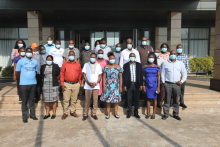WHO and Partners Support AMR Scientific Meeting
Freetown, 25th November 2021 - The World Antimicrobial Awareness (AMR) Week climaxed with a scientific meeting which attracted participants from across academic institutions, medical practice and scientific researchers who made various presentations that captured the status of AMR drivers in Sierra Leone, including the use of antibiotics in selected health facilities, HIV drug resistance, health financing and cost of AMR, surgical site infections and IPC strategies for AMR among others.
Perhaps the most worrying presentation is the use of antibiotics in selected health facilities in Sierra Leone. It reveals among other things that some hospitals have a 94% rate of prescribing antibiotics for patients whereas the WHO recommends 30%.
In her presentation, Dr. Janet Buck spoke about the drivers of AMR, noting that misuse and overuse of antimicrobials are among the key drivers. According to Dr. Buck, hospital management and senior staff should practice antimicrobial stewardship (AMS). AMS is a coherent set of actions which promote responsible use of antimicrobials. This definition can be applied to actions at individual level as well as the national and global, and across human health, animal health and the environment.
A presentation of Surgical Site Infections (SSI) by Dr. Suliaman Lakoh also shed light on the burden of healthcare-associated infections (HAI), Global burden of surgical site infections, Surgical site infections in Sierra Leone and Surgical site infections and antibiotic resistance in Freetown (SIARF). According to Dr. Lakoh, global estimates of HAI stand at 1.2% to 5.2% in the developed world while standing at 10.8% in developing countries such as Sierra Leone.
“One of the drivers of AMR and HAI is poor Infection Prevention and Control (IPC) practices; and our article ‘Intra-COVID-19 assessment of hand hygiene facility, policy, and staff compliance in two hospitals in Sierra Leone – Is there a difference between regional and capital city hospitals?’, reveal a hygiene compliance rate of only 18% in hospitals” said Dr. Lakoh.
In concluding his presentation, Dr. Lakoh recommended that routine surveillance of SSI and related antibiotic resistance is needed to guide the detection, management, and prevention in resource-limited settings; the use of antibiotics for surgical prophylaxis must be adjusted according to the specific context, considering the local antibiotic use and resistance data, the synthesis of local normative data should form the foundation of country-specific guidelines on surgical prophylaxis.
As AMR also affects animals and plants, a one health approach has been adopted by WHO and partners to integrate the efforts of the plants and animal sector in the fight to stop resistance. The ministry of Agriculture Forestry and Food Security, FAO and veterinarians also made presentations of the status of AMR in the various sectors and how they can collaborate for the singular goal of ending AMR.
While stimulating the discussions in the plenary, the moderator and IPC officer at WHO, Bobson Derick Fofanah, challenged the discussant scientists and medical practitioners to find local solutions to the key drivers of AMR.
“As we are all aware that inappropriate use of antimicrobials in humans, animals, and plants, coupled with inadequate infection prevention and control (IPC) practices and WASH facilities serves as the major drivers in the development of drug-resistant infections. We should leverage available opportunities and explore context-specific approaches for healthcare-associated infection surveillance and AMR research to support evidence and provide benchmark and target actions to combat AMR in Sierra Leone” said Bobson.
In her closing statement, AMR/IPC Lead at WHO, Anna Maruta expressed appreciation to all the participants, while emphasizing the significance of the annual AMR scientific meeting in combating AMR in Sierra Leone.
“Antimicrobial resistance is an urgent health challenge. Collecting AMR surveillance data is an essential approach to define the burden AMR. This conference provided a platform for researchers to present AMR research findings and discuss possible interventions that maybe implemented to improve the appropriate use of antimicrobial agents” said Anna.
The various scientific presentations at the World Antimicrobial Awareness Week in Sierra Leone indicate that there is much to be done to take the necessary steps to tackling the prevalence of AMR among the Sierra Leone population.



